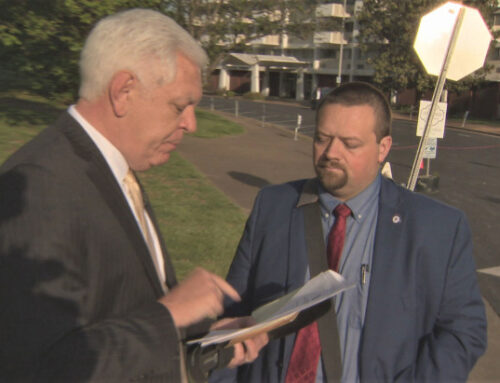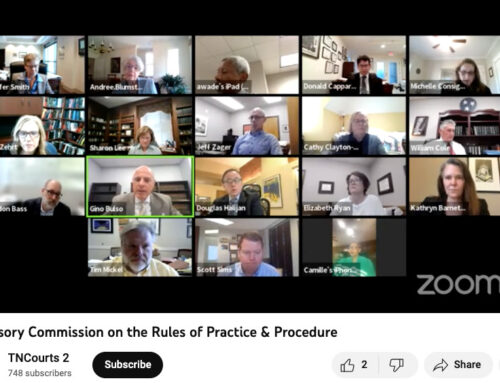The Knoxville News Sentinel in its Sunday edition digs into a lawsuit alleging violations of the Open Meetings Act in Greene County when approval was given to rezone land for a company that planned to make components for industrial explosives.
The Greeneville Sun has also covered the lawsuit involving US Nitrogen extensively as well as reported stories on the plant’s construction, application for permits and environmental opposition. Its stories can be found at this link.
The Knoxnews.com article is reprinted here, with permission. You can read TCOG’s column about the state’s open government laws regarding economic development here.
By Hugh G. Willett
Special to the News Sentinel
GREENEVILLE — The future of a controversial chemical plant in Greene County may rest on a jury’s decision about whether or not industrial development organizations are required to abide by the state open meetings law.
The lawsuit, filed in Greene County Chancery Court on April 2011, seeks to void rezoning of property where US Nitrogen is constructing a $200 million plant to produce ammonium nitrate, an ingredient used to make industrial explosives.
The suit, which goes to trial in October, also claims that officials in Greene County engaged in secret meetings and arranged land options with representatives of US Nitrogen in violation of the Open Meetings Act.
Plaintiffs include Greene County residents Bradley Lowe, Junior and Ivonne Belcher, and Public Spirited Citizens of Greene County. Knoxville attorney Herbert S. Moncier is representing the plaintiffs.
“The people have a right to know what’s going on in their government,” Moncier said.
In an amended complaint filed in October 2011, the plaintiffs alleged that sometime before Jan. 18, 2011, officials of Greene County in combination with the defendant, Greene County Partnership, entered into secret discussions for the Greene County Partnership to act as a public front for US Nitrogen without the public knowing.
The defendants include Greene County, the Greene County Commission, the Greene County Partnership and the Greene County Regional Planning Commission. Greene County Mayor Alan Broyles believes the lawsuit is unfounded. He denies that the process was anything but above the board.
“We tried to be as transparent as possible. All the proper notices were published,” he said.
Moncier contends that under the open meetings law everything that is now being discussed, including the environmental impact of the project, should have been publicly vetted before any zoning decisions were made.
Tom Ferguson, president of the Greene County Partnership, a local business development organization, said the county commissioners were individually briefed along with the local newspaper the day before any action was taken. The lawsuit is more of a nuisance, he said.
“We’ve done nothing to violate the Sunshine Law,” he said.
Greene County Commissioner Hilton Seay said he is comfortable with the way the project was presented to the commission. He said he’s “absolutely” certain the proper procedures were followed.
Judge Rules against dismissal
Earlier this year 3rd Judicial District Chancellor Douglas Jenkins ruled against a motion by the defendants that would have dismissed the case on the grounds that the Greene County Partnership is not subject to the Open Records/Open Meetings Act. The ruling cleared the way for the suit to go to trial in October.
If successful, Moncier believes the suit will open up public records that will show state and local officials were working secretly to bring the project to the county long before the public knew what was happening.
“All this information should have been disclosed to the public,” he said.
The lawsuit was prompted by a Feb. 8, 2011, meeting of the Greene County Regional Planning Commission and a subsequent meeting of the Greene County Commission, in which 400 acres of agriculturally zoned land was rezoned to M-2 “heavy impact industrial” zoning.
According to the complaint, the commission did not give timely notice of the meeting or adequately describe the property in question. Neither the notice nor the agenda for the meeting identified the beneficiary of the proposed rezoning, the complaint stated.
Ferguson said it is a standard practice for business development agencies to keep information about companies being recruited confidential until it is time for elected officials to make decisions such as zoning.
Standard practice or not, keeping information about such projects hidden from the public is a violation of state law, Moncier said.
Hidden Names, Private Meetings
According to the complaint, the rezoning was identified only as “Receipt #1650.” The defendants continued to conceal from the plaintiffs the identity of the company involved and the public nature of the rezoning issue, the complaint states, adding that the defendants also refused to comply with a public records act request for other records associated with the issue.
The suit contends there were private meetings of the members of the planning commission and members of the county commission before the Feb. 8 meeting where the rezoning occurred. Such meetings were held in violation of the Open Meetings Act, the complaint alleges.
During a regularly scheduled meeting of the Greene County Commission held Feb. 22, 2011, the plaintiffs, who included property owners near the proposed site, allege they were denied an adequate opportunity to be heard in opposition to the rezoning issue. During that meeting the rezoning was approved.
Plaintiffs are suing for declaratory judgment in determining the lawfulness of the acts taken by the defendants. They are seeking damages and fees pursuant to the violation of the “sunshine law” and attorneys fees. They also want the proceedings of the Feb. 8 meeting brought forth for judicial review.
The case has important implications for the citizens’ right to know about such development projects, according to Deborah Fisher, executive director of the Tennessee Coalition for Open Government.
“This might be a great thing for Greene County, but the decision should have been made with the greatest transparency, not in secret,” she said.
In other causes of action, the complaint alleges that county commissioners communicated directly among themselves and/or through intermediaries before the Feb. 22 meeting to deliberate toward the rezoning action.
In addition to declaring the rezoning voted on at the Feb. 8 and Feb. 22 meetings void and of no effect, the complaint asks that the court issue an injunction enjoining defendants from further violations of the Open Meetings Act. Each occurrence of a meetings not held in accordance with the act should be declared a separate violation, the complaint states.
Greene County attorney Roger Woolsey is representing the defendants. He did not respond to requests for comment.




